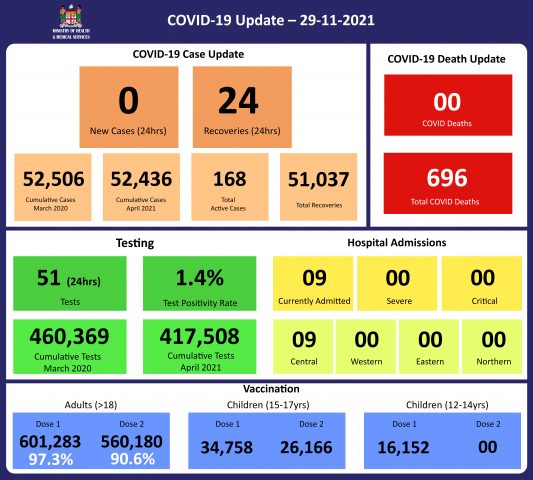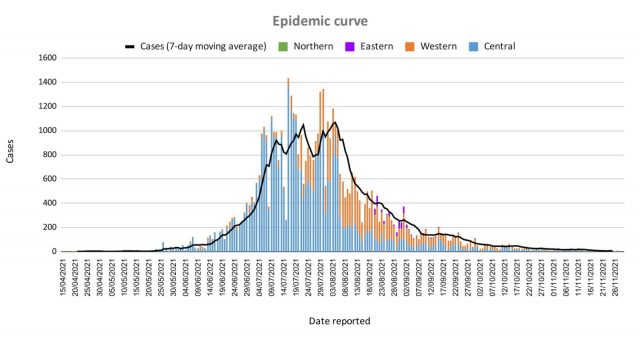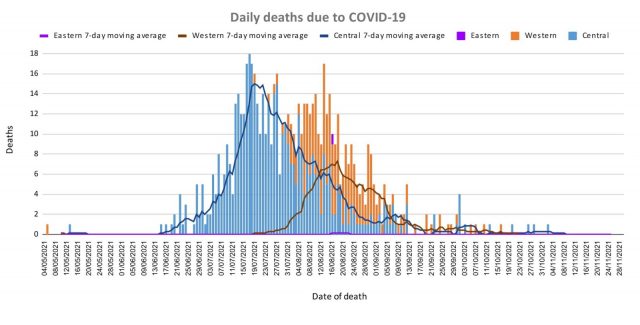COVID-19 Update 29-11-2021
COVID-19 Situation Update
Monday 29th November
| Transmission Update:
Since the last update, we have recorded a total of 12 new cases; of which 4 new cases were recorded on 27/11/2021, 8 new cases were recorded on 28/11/2021, and nil new cases in the last 24 hours ending at 8 am this morning. This epidemic curve depicts the daily positive cases since the 2nd wave of this outbreak that began in April 2021. Overall, for this 2nd wave, there have been 52,436 cases recorded, with 71% of the cases from the Central Division, 28% of the cases from the Western Division, and 1% of the cases from the Eastern and Northern Division. Our National 7- day rolling average is 7 daily cases calculated for 25th November 2021. |
| Deaths:
This curve depicts the daily death count by division since the 2nd wave of this outbreak began in April 2021. Overall, the death rate graphs for the Central and Western Divisions indicate a declining trend. The differences between the Central and Western are similar to the incidence of the daily cases and are likely a reflection of vaccination levels, COVID mitigation measures, and differences in population density. There is no COVID-19 death to report There have been a total of 696 deaths due to COVID-19 in Fiji, with 694 of these deaths during the outbreak that started in April this year. Please note that due to the time required by clinical teams to investigate, classify and report deaths, a 4-day interval is given to calculate the 7 days rolling average of deaths, based on the date of death, to help ensure the data collected is complete before the average is reported. Therefore, as of November 25th, the national 7 days rolling average for COVID-19 deaths per day is 0.0, with a case fatality rate of 1.32%. We have recorded 604 COVID-19 positive patients who died from serious medical conditions they had before they contracted COVID-19; these are not classified as COVID-19 deaths. |
Epidemic Outlook:
The Ministry of Health continues to monitor the outbreak using indicators such as daily case numbers, hospitalizations, test positivity, and deaths.
Occupancy rates in health facilities, the occupancy rate of ICU beds, death rates, and vaccination coverage are indicators to monitor our health response capacity and we see a decreasing trend across indicators from our health facilities with increasing vaccination coverage for adults and 15-17-year-olds in Fiji. With the commencement of vaccination for 12-14-year-olds, we expect their coverage to contribute to reducing the risk of severe disease, hospitalization, and death.
With borders opening in the next two days, we anticipate our testing numbers to increase from international repatriates and travelers including Fijians visiting families and friends. With increasing COVID-19 cases in the European region, and the emergence of the new variant of concern; B.1.1.529, named Omicron, noted to have several mutations, is a cause for concern. Our border health measures and surveillance will need to be strengthened and maintained.
Our weekly testing numbers of over 4,000 are still above the WHO recommended rate of 4 tests per 1,000 population per week (or approx. 3,500 tests per week) and we anticipate continued surveillance and testing in our communities and maritime islands to monitor and detect cases for early intervention.
Public Advisory:
Omicron
The Ministry of Health and Medical Services has continued to review findings released by international experts on the Omicron variant of the COVID-19 virus. Based on advice from the World Health Organization released today, we note the following:
Transmissibility: It is not yet clear whether Omicron is more transmissible (e.g., more easily spread from person to person) compared to other variants, including Delta. There is some reported field evidence of increased transmissibility in South Africa however epidemiologic studies are underway to understand if it is because of Omicron or other factors. The public is advised that if indeed the virus is more transmissible than delta, then it will be inevitable that it gets to Fiji. In this instance the current steps we are taking do not change; we work on better positioning ourselves to deal with a third wave, irrespective of whether it is through Omicron or the current Delta variant that is endemic to Fiji.
Effectiveness of vaccines: While there is ongoing effort to understand the impact of this variant on vaccines, it is important to understand that vaccines remain critical to reducing severe disease and death, including against the dominant circulating variant, Delta. Current vaccines remain effective against severe disease and death. It should be noted that South African states are poorly vaccinated compared to Fiji, and all our COVID safe measures are proven to work in reducing transmission especially within a highly vaccinated population. We are continuing our efforts to vaccinate all our children 12 to 17 years and providing booster doses to front liners and vulnerable persons.
The severity of disease: There is preliminary data suggesting increased rates of hospitalization in South Africa, but this may be due to increasing overall numbers of people becoming infected, rather than a result of a specific infection with Omicron. South Africa and the nearby region is a poorly vaccinated region and an increase in transmission of COVID 19, whatever the variant, will result in an increase in the number of hospitalization. Understanding the impact of the Omicron variant on disease severity, especially in the vulnerable, will take days to several weeks.
Effectiveness of prior SARS-CoV-2 infection: There are early data to suggest that people who have previously had COVID-19 could become re-infected more easily with Omicron, as compared to other variants of concern, but the information is limited. More information on this will become available in the coming days and weeks.
Effectiveness of current tests: The PCR tests used in Fiji continue to detect infection, including infection with Omicron. Concerns on the impact on other types of tests, including rapid antigen detection tests remain under study.
Effectiveness of current treatments: Standard treatments (including Corticosteroids – Prednisone) that we have in Fiji will still be effective for managing patients with severe COVID-19.
We are being encouraged to continue to implement effective public health measures to reduce COVID-19 circulation overall, using risk analysis and a science-based approach. The Ministry of Health and Medical Services is continuing to improve public health and medical capacities to manage an increase in cases. As such the remodeling of the health service provision will continue its current focus on:
- Community surveillance through test trace and track protocols is being escalated to help us identify and contain any outbreak early.
- Registration and line listing of vulnerable persons especially in poorly vaccinated areas has been done;
- Preparations for the monitoring of positive cases and vulnerable persons to ensure better access to appropriate care plans has been made;
- Clinical care protocols for the severe disease has been reviewed and strengthened;
This new variant is a reminder that for as long as there is a pandemic, Fiji will continue to face a threat from the virus and its variants. If transmissible enough, stringent border and community measures will only delay the inevitable entry and spread of current and future variants of the COVID 19 Virus. Fiji citizens will only be safe if we remain COVID-safe with 2-meter physical distancing; mask wisely by carrying a mask when you out of your home and wear the mask properly in public indoor spaces, public service vehicles, and outdoor crowded spaces; open windows to improve ventilation; avoid poorly ventilated or crowded spaces; keep hands clean; cough or sneeze into a bent elbow or tissue, and get vaccinated when it’s your turn.
Supporting School Re-opening
COVID-19 poses a lower risk to children however secondary transmission from young school-age children can and does occur in both household and school settings. Whilst our vaccination program of children is ongoing, it is important that we appreciate that all our community-based COVID safe measures are important measures to ensure the safe return of our children to school. The Ministry of Health and Medical Services is concerned about the adverse impact that school closure is causing to the mental and physical health of our children, and also to our medical programs in schools. In much the same way that we need to be COVID safe to help keep our borders open we also need to be COVID safe to help open our schools and keep them open.
Last Updated on 5 months by Publishing Team



